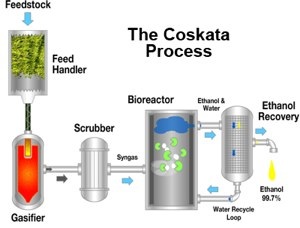Sponsors

Algae 2020:
Biofuels Markets, Strategies,
Players, and Commercialization Outlook
460 pages, published June 2009
www.emerging-markets.com
| | | | | | Top Story
 From the 2008-09 "winter of our discontent" to 2009's "Summer of Algae," biofuels have made a remarkable journey in the past six months. But what has become of the former darling of industry dreams - cellulosic ethanol - a fuel and processing technology that one wag said "always was, and always will be five years away"? From the 2008-09 "winter of our discontent" to 2009's "Summer of Algae," biofuels have made a remarkable journey in the past six months. But what has become of the former darling of industry dreams - cellulosic ethanol - a fuel and processing technology that one wag said "always was, and always will be five years away"?
While attention this year has been justly diverted to the entry of ExxonMobil into the algae race, not to mention the heady progress towards commercialization at PetroAlgae, Solazyme, Algenol, Sapphire Energy, Aurora and Solix just to name a few, the industry formerly known as "cellulosic ethanol" has been quietly transformed into something that is just as much about cellulose, but not nearly as much about ethanol.
Cellulosic ethanol was promoted as "not your Dad's ethanol," but the leading companies today are not producing "your Dad's cellulosic ethanol" either.
Here are some trends. More trends and analysis of the cellulosic frontier in "Sugar, Sugar: the transformation of cellulosic ethanol" at biofuelsdigest.com.
It's the cheap sugars, stupid. No matter what anyone describes as the "Holy Grail of Biofuels" or "the mother of all biofuels challenges," they are the same thing. Sugar, sugar. Whether it is tricking algae to convert sunlight and CO2 into sugars that it will later convert to oils, or making fermentable simple sugars from landfill waste or switchgrass, the key to making fuels affordable is the total cost of the simple sugar.
Sustainable, affordable, reliable, available. SARA is the remarkable acronym coined by Tom Murphy of Woodland Natural Resources for what biomass must be if it to be useful as a feedstock for the new fuels and chemicals.
"One word: Plastics". Whatever methanol's or ethanol's shortcomings as a fuel, they are a remarkable platform for chemicals. Upgrading from a base, options like propylene and polyethylene come on to the table, once the simple sugars of biomass have been converted into a simple alcohol. Companies like ZeaChem and LS9 have increasing focus on renewable chemicals, and are finding backers like Dow Chemical who are looking for sustainable sources far away from the Middle East and other hotspots where manufacturing is based to be close to the feedstocks.
More at biofuelsdigest.com.
| 
| | Producer News
In Washington, the Department of Energy is offering a webinar on July 29th on "How to Estimate the Economic Impacts from Renewable Energy". The webinar will feature a DOE-developed tool to estimate the economic impacts from renewable power generation. Participants will learn to use an online economic model-called Jobs and Economic Development Impacts (JEDI)-to design and run an economic impacts analysis and interpret the results.
In Virginia, Dynamotive announced that independent analysis of upgraded BioOil samples have confirmed 20 percent gasoline, 30 percent jet, 30 percent diesel, and 20 percent vacuum gasoil fractions. The company uses a pyrolysis process to produce BioOil from lignocellulosic biomass, which is then hydro-reformed to a Stage 1 gas-oil equivalent or upgraded to transportation grade fuels in a State 2 hydrotreating process.
In Iowa, POET confirmed that it is targeting payments to farmers of $30 to $60 per ton for corn stover (cobs and stalk), and said that farmers could increase these payments through the Biomass Crop Assistance Program. An Iowa farm averages 1.5 tons of corn stover per acre, or $45-$90 per acre in value before BCAP payments are considered.
|  Algae Biomass Summit Algae Biomass Summit
October 7-9, 2009
San Diego Marriott and Marina (California)
Exploring the emerging industry of algae as feedstock for biofuels and its related products.
Registration, sponsorship and speaking info. | | World Opinion
From the New York Times: "The catch is that biobutanol has always been very expensive to produce (which is why it was abandoned after widespread use in the first half of the 20th century). DuPont says it has a new way of making biobutanol, using a microbe. "We will be at a cost-equivalent of ethanol on an energy basis."
From the Energy Tribune: "Methanol makes a fine racing fuel but is entirely unsuited for mass market application. I'm perplexed why one member of Congress would be quoted as saying he wouldn't have supported the Waxman-Markey bill without its methanol provision...Start with the energy side of these drawbacks. Turning natural gas into methanol consumes around 1/3 of the energy content of the gas...We'd be much better off just putting the natural gas directly into cars."
| 
| | International News
In China, the Motley Fool said that 97 percent of its 806 investors in its CAPS community who have rated Gushan Environmental Energy said that the company will outperform the S&P 500, and that the company has earned a five-star investing ranking from the Fool.
In the UK, an annual review of emissions by the household of Prince Charles revealed that the Prince's estate's reduced overall carbon emissions by nine percent. The remaining 3,775 tons of CO2e emissions were offset with investments in an agency that promoted tree planting and conservation. The Prince's efforts have included a conversion of Jaguar and Land Rover vehicles to used cooking oil-based biodiesel.
In Canada, Lignol Energy reported a full-year loss of $6.2 million compared to a loss of $4.6 million for the previous year, and said that the wider losses reflected an increase in R&D spending to $13.3 million. Lignol CEO Ross MacLachlan said that the company's 2010 goals are to "evaluate specific locations and opportunities for constructing a major commercial demonstration plant."
| | Research News
In Colorado, BBI International released the first in what it said would be a series of state-level reports on the impact of installing biomass-fired combined heat and power (CHP) facilities at ethanol facilities. The reports analyze the economic impact of the CHP facility, as well as the biomass required to run the plant, the capital costs, and impact of the plant on projected prices for natural gas, electricity, and biomass.
| | Policy & Policymakers
In North Dakota, Gov. John Hoeven said that he is seeking $35 million in federal energy grants, on behalf of Great River Energy, to install a new steam system at the Spiritwood Industrial Park near Jamestown. Hoeven said that the project's investors would cover the remaining $340 million of the total investment required. Plans are in place to expand the Spiritwood operation to include a biofuel facility.
| | Consumer, Fleet and Event News
In Brazil, Alkol has developed a 1HourFlex technology, and said that the system "allows any car to run on any amount of gasoline or ethanol in less than 1 hour". The system has 3 components: an Electronic Converter that alters fuel injection timing, an Ignition Remapper to alter spark plug firing time, and a Cold Start System to quickly start on cold days.
| | Financial News
The Biofuels Digest Index™ (BDI), a basket of public biofuels stocks, gained 1.52 percent to 57.57 on algae and Big Grain advances. For the day, Archer Daniels Midland (ADM) gained 1.90 percent to $28.47, while BP advanced 1.26 percent to $48.94. Among small caps, PetroAlgae (PALG.OB) gained 17.38 percent to $9.39. Overall, advances led declines 2 to 1 for the day.
| | These stories and more are available at BiofuelsDigest.com. Your comments and story requests are warmly welcome: email me at jlane@biofuelsdigest.com. Jim Lane, Editor, Biofuels Digest.
| | |






 From the 2008-09 "winter of our discontent"
From the 2008-09 "winter of our discontent"



No hay comentarios.:
Publicar un comentario